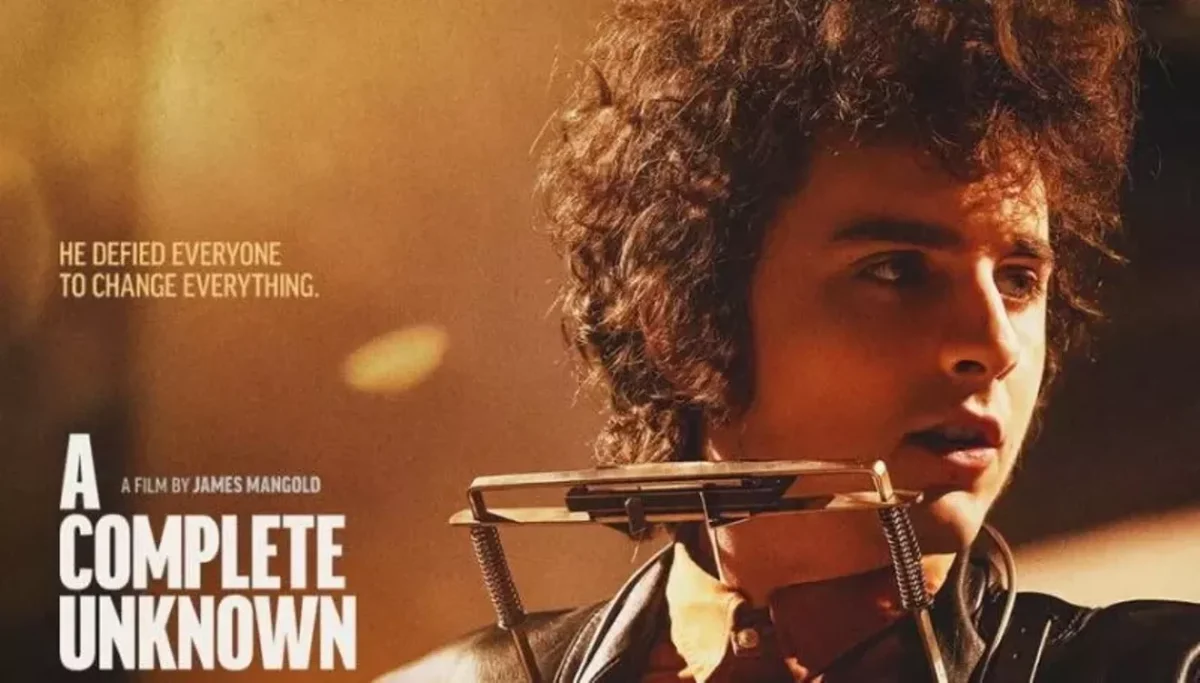There’s a scene in James Mangold’s new Bob Dylan biopic where the subversive, dry-spoken, 20-year-old star, portrayed by Timothée Chalamet, gets in a fight with his then-lover Joan Baez. Exasperated, Baez turns to him:
“You’re kind of an a–hole, Bob.”
What’s so great about this latest fictionalization of Dylan’s life (and there are many) is that it embraces the famed songwriter’s multifaceted personality. There’s Bob the humble, starstruck teen, Bob the brilliantly enigmatic songwriter, and, yes, Bob the abrasive, disparaging jerk.
“A Complete Unknown” diverges from the mediocre fates of visually impressive but substantively shallow musical biopics like “Yesterday” (The Beatles) and “Bohemian Rhapsody” (Queen) because of its focus and grounding in a cultural turning point.
The film begins with the Minnesota-born Dylan marching prophetically into Manhattan’s Greenwich Village in 1961 with nothing but a bag of clothes and a guitar slung across his back. In search of his recently-hospitalized folk music idol Woody Guthrie, Dylan befriends Guthrie’s fellow folk legend Pete Seeger and plays his music for him. Soon enough, it’s gigs at local bars, stints as a session musician, and finally a record deal and Dylan has been slingshot towards stardom, hailed as the messiah of the folk revival. Along the way, he bounces in and out of affairs with Baez and Sylvie Russo (a representation of Dylan’s real life partner Suze Rotolo).
It’s easy to sympathize with the early Bob, portrayed ingeniously by Chalamet—his disheveled hair, mumbled deference, and slouched frame belie the astoundingly fluent political activist that we know the historical Dylan to be. Dismayingly, the movie seems to revel in the idea of Dylan’s principles (nonviolence, nuclear disarmament, and social equality, to name a few) more than the principles themselves: all we get are vague snippets of Cronkite as Mangold seems to hurriedly check boxes from the ‘60s pop culture catalog. The moon. Cuban missiles. Birmingham. Kennedy.
Still, it’s hard to dock the film for glossing over the dynamic cultural landscape of that decade. Really, what Mangold wants us to see is the emerging friction between the conflicting ideals that accelerate the film towards its climactic end. Humility and hubris. Conformity and contrarianism. Propriety and creation. These contradictions manifest themselves in the form of budding animosity between Dylan and those who magnetized him towards music to begin with. A scene where Dylan refuses to play his early hits but instead insists on showcasing new material (even to the crowd’s raucous booing) glorifies his insatiable appetite for change. And we see a definitive change in his character when he storms out of a cocktail party packed with record label bigwigs (“I wish they’d f—k off and let me be…whatever they don’t want me to be”).
Critically, though, the film remains laser-focused on pushing the narrative towards a defining moment in Dylan’s career, and makes a case for its place in larger musical and cultural history. At the Newport Folk Festival in 1965, Dylan took the stage wielding a Fender Stratocaster backed by an electric band. Outraged, folk purists, role model Seeger included, heckled him off the stage.
Herein lies the subtle power of the film’s conclusion. When Dylan returns to the stage, alone, acoustic guitar in hand, and launches into “It’s All Over Now, Baby Blue,” the crowd is elated. Instead, the lyrics, characteristically enigmatic, suggest a sly knock against his fans as Dylan embraces the era of rock ’n’ roll (“You must leave now, take what you need, you think will last…Strike another match, go start anew”). Indeed, Dylan wouldn’t return to Newport until 2002, when he would show up cheekily sporting a wig and fake beard. That the irony of the situation is lost on his devotees mocks their ignorance and drives Dylan forward, liberated from the weight of their expectations. Even though it’s underdeveloped at times, the film assembles a satisfying mosaic of ‘60s culture, pitting the catalysts of a tumultuous decade against each other through the lens of a generational artistic talent.
Dylan, the only songwriter to have ever won a Nobel Prize for literature and whose catalogue is analyzed in the context of Greco-Roman playwriting at Harvard, signed off on the production of “A Complete Unknown” in 2019. Chalamet trained for five years to master Dylan’s spacey mannerisms, gravelly vocal style, and rollicking guitar sound, and it shows. The ‘60s decor is also consistently on point, pale green lead-lined fridges and all. This hasn’t gone unnoticed. Mangold’s film and its cast were nominated for eight Academy Awards last month.
“A Complete Unknown” will inevitably draw scorn from the Dylan purists and the chronologically scrupulous. But step down from your chrome horse and cast the Siamese cat from your shoulder, and you will find a tasteful portrait of an icon.







































